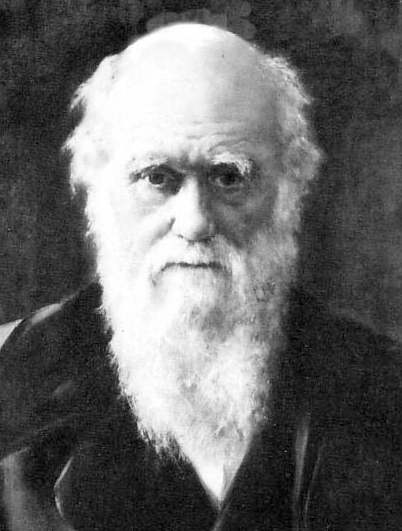 I can't do his life story or his gargantuan contribution to science justice in one small post, so I won't even try. Instead, I'm celebrating the day with some fun facts, awesome quotes, and celebratory pictures that link you to stories about Darwin's life, science and legacy.
I can't do his life story or his gargantuan contribution to science justice in one small post, so I won't even try. Instead, I'm celebrating the day with some fun facts, awesome quotes, and celebratory pictures that link you to stories about Darwin's life, science and legacy.The Quotable Darwin
"Nothing before had ever made me thoroughly realise, though I had read various scientific books, that science consists in grouping facts so that general laws or conclusions may be drawn from them."
-Autobiography
"Doing what little one can to increase the general stock of knowledge is as respectable an object of life, as one can in any likelihood pursue."
-Life and Letters of Charles Darwin
"Ignorance more frequently begets confidence than does knowledge: it is those who know little, and not those who know much, who so positively assert that this or that problem will never be solved by science."
-The Descent of Man
Fun Fact:

Darwin's Nose Almost Cost Him The Voyage on the Beagle
"Afterwards on becoming very intimate with Fitz-Roy, I heard that I had run a very narrow risk of being rejected [as the Beagle's naturalist], on account of the shape of my nose! He was an ardent desciple of Lavater, and was convinced that he could judge a man's character by the outline of his features; and he doubted wheather anyone with my nose could possess sufficient energy and determination for the voyage. But I think he was afterwards well-satisfied that my nose had spoken falsely." (Source: Charles Darwin: His Life Told in an Autobiographical Chapter, and in a Selected Series of His Published Letters, by Charles Darwin - 1902)A Place for Thoughts on Evolution to Evolve - Darwin's Kent
 Darwin's Thinking Path
Darwin's Thinking PathIn reality the famous Sand Walk (see fig. 1) that is known to have been so important to Darwin’s work started at the back of the house and continued along in front of the green houses and kitchen gardens to the west end of the great meadow where it turned left and disappeared into a small woods that Darwin himself had created. Darwin has described how he would take a ‘daily constitutional walk’ along this path while he thought about the meaning of the observations he was making and about the ideas they generated. We can only speculate on how important the sand walk was to the development of the Theory of Evolution as it took shape in the consciousness of his mind over more than 20 years.Evolution in the English countryside:
Darwin frequented the chalk downland close to where he lived. 'Orchis Bank', now Kent Wildlife Trust's Downe Bank, was a favourite place of his. The studies of wild orchids formed the basis for his explanation of the co-evolution of flowers and their insect pollinators. The site is thought to have inspired his vision of a 'tangled bank' in the conclusion of The Origin of Species, a passage which emphasises the intricate interrelations of different species.

Discovering the tree of life
The famous sketch on the right is from Notebook B and depicts the branching system of descent with modification which Darwin realized could explain the relationship between different species in the same class or family. The most ancient forms are at the bottom and their descendants branch off irregularly. The lines with a crossed end are existing species and those without represent extinct species.Transcription of pages 36 and 37:
I think
[sketch]
Case must be that one generation then should be as many living as now. To do this & to have many species in same genus (as is) requires extinction.
Thus between A & B immense gap of relation. C & B the finest gradation, B & D rather greater distinction. Thus genera would be formed. — bearing relation
to ancient types. — with several extinct forms
for if each species an ancient (1) is capable of making 13 recent forms, twelve of the contemporarys must have left no offspring at all, so as to keep number of species constant. —
With respect to extinction we can easy see that variety of ostrich, Petise may not be well adapted, and thus perish out, or on other hand like Orpheus being favourable
 Darwin's Enduring Legacy
Darwin's Enduring LegacyCharles Darwin was one of science’s most inspired thinkers. The greatness of his contributions cannot be understated. His insights into the mechanisms of evolution serve as the foundation for all of 21st century biology, as well as many other fields of study such as psychology, biochemistry, epidemiology, paleontology, anthropology, sociology, philosophy. In addition, his ideas and discoveries strongly influenced the development of statistical methods of data analysis that are now in widespread use in the sciences, economics, and politics. In other words, the effects of Darwin’s work were multidisciplinary as well as far-reaching and long lasting.
But the greatest tribute of all may be his friend and champion Thomas Henry Huxley's exclamation when first hearing of the idea of natural selection: "How extremely stupid not to have thought of that!"
Happy birthday to the man who showed us "endless forms most beautiful." Many happy returns, old chap!







1 comment:
Darwin's Nose Almost Cost Him The Voyage on the Beagle
It's ironic that Darwin, who so clearly represented the kind of disciplined, evidence-based rational thought that science requires, was almost left behind thanks to such nonsense.
Happy Darwin Day.
Post a Comment